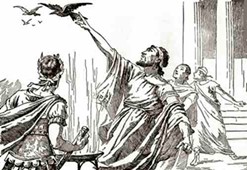Are you watching the Speaker of the House discuss White House policy? You could say she's an "augur" of the modern age. This post unpacks the meaning and origin of this expression.
Meaning
An "augur" originally meant a person connected to the divine that could foretell the future. They would look at the environment and interpret the movements of animals and the growth of plants to determine future events shaping public awareness and experience.
The augur would look to the heavens and use the constellations to predict future events, similar to astrologists today. However, the modern use of "augur" refers to someone in a position of power that shapes public policy.
For instance, government officials that shape public policy, such as mayors, senators, and presidents, qualify for the title of "augur." An augur can also refer to celebrities or people with influence shaping people's thoughts about a specific subject matter.
Example Usage
"The augurs are out there shaping public policy again. They act like they have the best intentions for the people, but the reality is they make up the rules to benefit themselves."
"We'll have to see what the augers have in store for us this election season. They're warmongering idiots that don't care about the people."
"The augers claim they have our best interests at heart and want to see the poor get lifted out of poverty. In reality, they cut takes for the rich and make it harder on the little guy to get by in life."
"The augurs of the world meet at Davos to discuss how we need to be greener and cut emissions. They fly there on private planes and eat wagyu steak while they tell us to eat bugs and walk more."
"The augurs of the world don't care about the poor and middle class. They shape policy that makes it easier for them to avoid taxes and live better lives while the rest of us suffer."
"I don't follow what the augurs of the planet tell me to do. Those people can go jump off a bridge."


Origin
The term “augur’s” originates from Latin in the 1540s. It first appears in roman times, describing a Roman with the duty of observing and interpreting auspices and natural signs to read future events. It’s similar to the ancient Egyptian equivalent of a “Pharisee.”
The meaning of the term stayed the same throughout the centuries. However, the people it referred to changed over time. It’s unclear when “augur” started referring to people in the modern era who shape public policy, such as politicians.
There are no records of who coined the term in this regard or its use in the modern context of the saying.
Phrases Similar to Augurs
- Authority.
- Superiors.
Phrases Opposite to Augurs
- Oppressors.
What is the Correct Saying?
- Augers.
Ways People May Say Augurs Incorrectly
The term "augers" defines people in high places of authority, such as the president or the pope. These individuals shape society. It's common for people to use the word to describe people with any influence over their life, like their parents, but this is incorrect. Using the spelling “augers” is incorrect, this definition refers to a drill.
Acceptable Ways to Phrase Augurs
You can use the term "augurs" to describe politicians and people in places of authority that shape public policy or social outcomes. For instance, the president, senates, and house of representatives are augurs of United States policy. They shape the future of the country to the will of the people. However, augur can also describe someone that thinks they have superiority over someone else.
You can use the expression to refer to anyone with a position of authority in your life. They have an impact on your social and professional life. For instance, you could refer to your parents or teachers as your "augers," or you could refer to the city mayor or the leader of a group as an augur if they have a sense of authority over you.